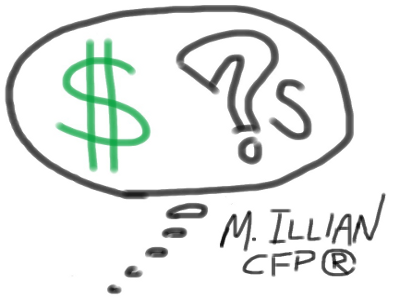Q: I have $58k in student loan debt. I am earning $50k/year and I have $10k in savings. Should I focus on paying off my debt or make minimum payments and save for retirement?
Sincerely, Debt Burdened
$ ?s answered by Matthew Illian, CFP®
Dear Debt Burdened,
I don’t expect to provoke a news story by stating that many young people feel under water with their college debt payments. However, my recent interactions with those who share this burden were eye opening. I recently participated in a Kiplinger Jump-Start Your Financial Plan live chat, and most of the questions we received related in some way to college debt payments just like yours and many others.
According to The Project on Student Debt, two thirds of college seniors graduate with an average debt of $25,250, and many have additional credit card balances that they used to pick up incidentals. Increasing numbers are defaulting, and with a looming rate increase, U.S. politicians are scrambling to find a way to tie their name to an effort that will freeze student loan rates. But they are hampered by a pesky $5.9 billion price tag.
When deciding whether to pay down or save up, you need to compare the interest rates. In this interest rate–starved environment (thank you, Ben Bernake), you would be foolish to pay more than 5% on your debt.
I typically recommend paying down this debt as quickly as possible unless you have a subsidized rate below 5%. If the alternative is a corporate matching retirement plan, I might be willing to bump the threshold rate up to 8% but no higher. Generous company-matching opportunities can provide up a 100% return on your money which is painful to pass up but this is a good example of a situation where the mathematical answer and the right answer often diverge. Saving for your retirement by ignoring your high-interest debt burden is an exercise in futility. Psychologically, debt is an emotional weight that will not be relieved if you are not making significant progress towards payoff.
Some private lenders are advertising student loan rates as low as 3%, which makes them look attractive, but private loan rates are usually variable, meaning they could shoot higher if overall rates rise.
Those with federal loans have much greater payment flexibility and protections. For example, you can now choose a repayment option called Income-Based Repayment (IBR), often the best of five alternative repayment plans for those who feel swamped by their federal loans. This option sets your payment based on income, family size, and public service, or 25+ years of payments will lead to loan forgiveness.
If you aren’t sure what kind of loans you have, visit the National Student Loan Database System for Students. Select “Financial Aid Review” for a list of all federal loans made to you, or call 1-800-4FEDAID (1-800-433-3243). Your college’s financial aid office will also have this information.
I don’t suggest liquidating an entire savings account to pay down debts. If you have nothing left for emergencies, you will set yourself up for inevitable frustration when you need to go back into debt to replace a washing machine or a timing belt on the car. Keep at least $1k in a liquid savings account to take care of these inevitable situations.
You will need to have a plan which will start with a basic budget. Paying more than 10% of your income debt reduction is not typically sustainable, but many people have found creative ways to get aggressive. Like a champion Kenyan long-distance runner, your debt repayment plan will require a balance of speed and stamina.
If your debt burden is significant, consider joining a Dave Ramsey–sponsored Financial Peace support group. Or find a personal mentor who can provide the personal accountability you need to help you achieve your goals. Nothing challenging in life is accomplished alone.
If you have a money question that is nagging at you, please submit it using our contact page, http://www.marottaonmoney.com/contact. We try to respond to every question. If yours is chosen for MONEY QUESTIONS, we will give you a pseudonym and let you know the date the Q&A is published.

One Response
fsgb80v7cbwe
Great website…
please visit the sites we follow, including this one, as it represents our picks from the web…